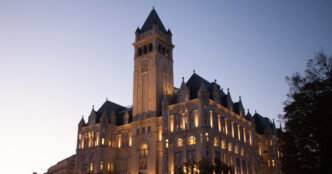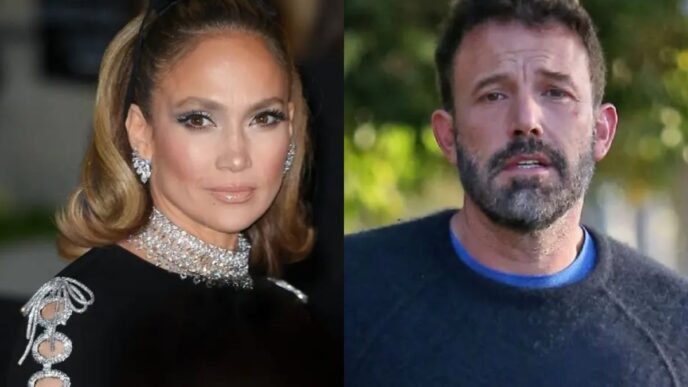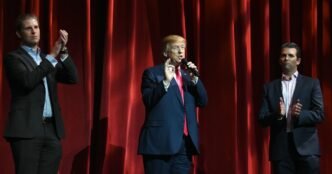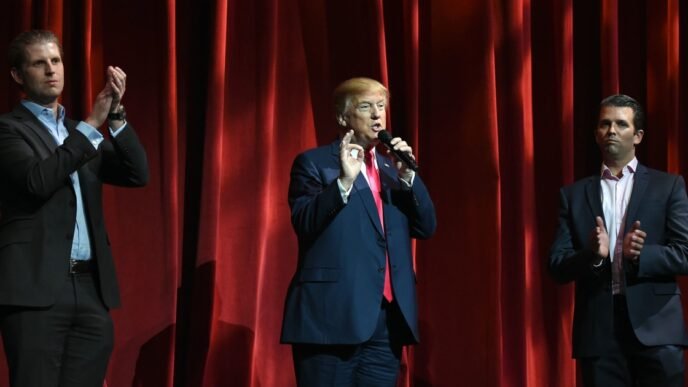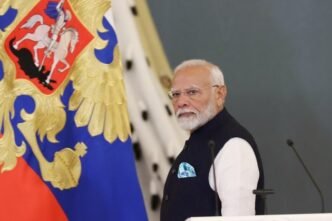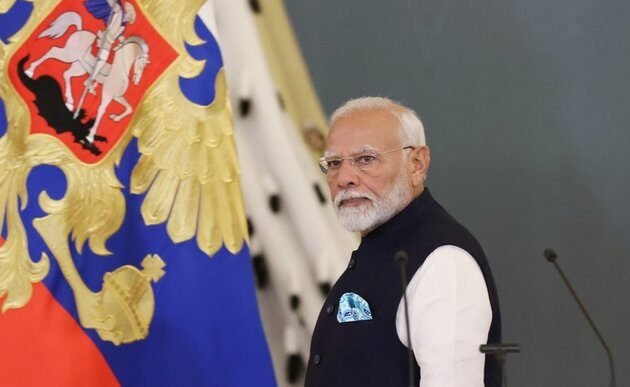Donald Trump overcharged Secret Service agents protecting him and his family for rooms at his hotel in Washington while he was president, a new report from House Democrats alleges.
Trump also benefited from foreign and domestic officials, including people seeking jobs in his administration or pardons from him, who paid for rooms at what was then the Trump International Hotel in downtown Washington, according to the report, which was obtained by NBC News.
The allegations are part two of an investigation by Democrats on the House Oversight Committee into financial benefits Trump received in office, or, as the party puts it, Trump’s attempts to enrich himself, often at taxpayers’ expense.
Trump’s campaign did not immediately respond to a request for comment on Democrats’ findings.
The new report is limited in scope, based on records of spending at Trump’s Washington hotel over just 11 months of his presidency — from September 2017 to August 2018 — which the panel obtained after a lengthy court battle over subpoenas issued to the Trump Corporation’s former accounting firm Mazars.
Still, Democrats say it offers a window into the ways Trump used the Oval Office to fill his private company’s coffers and curry favor from foreign governments and people looking for access to and benefits from the Trump administration.
For one, the report accuses the Trump Corporation of jacking up the prices of hotel rooms at the property for the Secret Service, in some instances to the tune of 300% more than the approved government per diem rate and beyond what other guests were being charged for rooms on the same nights.
The report points specifically to Nov. 28, 2017, when the Secret Service paid $600 apiece for several rooms for agents guarding Trump’s son Eric and his wife, Lara. On the same night, records show, more than 80 rooms were rented out at the Trump hotel at less than $600 a night.
In addition to the fees paid by the Secret Service, Democratic investigators say eight U.S. ambassadors, three people Trump appointed to be federal judges, two state governors, a state legislative delegation and a Trump Cabinet secret stayed and spent money at the Trump hotel while they were serving as state or federal officials during the 11-month period the committee investigated.
One was Kelly Craft, whom Trump appointed as U.S. ambassador to Canada and later as ambassador to the United Nations. Craft booked rooms at the Trump hotel on 20 nights over the 11-month period, spending close to $30,000. The report shows communications in May 2018 between Craft, who was then ambassador to Canada, and her staff, who offered her different hotel options closer to an upcoming conference she was planning to attend at National Harbor, in Mland. But emails the committee obtained from the State Department show she insisted she stay at the Trump hotel.
Democrats also found that four people whom Trump nominated to ambassador postings, four people who served as Trump administration officials or on federal commissions or boards, one person he nominated to a federal judgeship and five people whom he ultimately pardoned stayed at his hotel during the 11-month period.
Among the pardon seekers was Albert Pirro, the ex-husband of Fox News host Jeanine Pirro, who spent more than $2,000 for at least four stays at the Trump hotel in 2018, according to the committee. Pirro was convicted on federal conspiracy and tax evasion charges in 2000 and received one of a flurry of pardons Trump issued right before he left office. The committee does not allege that Pirro was overcharged for his stay and notes that Trump once kept him on retainer as a real estate lawyer.
In total, the panel examined $300,000 in payments the Trump Corporation took in over 11 months that Democrats argue violate the emoluments clause of the Constitution, which prohibits the president from receiving compensation from foreign or domestic governments, including states, outside of the official presidential sal.
The Constitution does not provide a remedy or a clear penalty for violations of the emoluments clause, however, and Trump frequently tested its limits in office. He originally planned to hold meetings around the 2020 Group of Seven summit at his Doral golf resort in Florida, but he reversed course because of scrutiny over how his private business would benefit from the event. Trump expressed frustration over having to move the event, telling reporters at a Cabinet meeting that he blamed “you people with this phony emoluments clause.”
Democrats would have liked to have had a fuller picture of spending at Trump’s hotel, but Republicans canceled their subpoenas to Mazars and others in the Trump investigation after they took control of the House in 2022.
“While this is an exceedingly small window into the opaque web of more than 500 corporations, limited liability companies, and trusts that Donald Trump carried with him into the presidency,” the report says, “it is enough to reveal hundreds of unconstitutional and ethically suspect payments he accepted while in office from domestic sources—including a federal agency, numerous federal and state officials, and individuals who sought, and frequently obtained, federal offices as well as presidential pardons.”
Trump has also faced several lawsuits accusing him of violating the clause, but the courts have rejected them for a variety of reasons. The new report does not even suggest a penalty for Trump directly but instead encourages Congress to write tough legislation that would define clear penalties for officeholders who violate the emoluments clause.
“The findings of these Democratic staff reports reveal significant shortcomings in the current federal anti-corruption framework—shortcomings that Donald Trump exploited to the tune of millions of dollars and intends to exploit again if he is returned to the Oval Office,” the report’s authors write. “As such, these reports are urgent calls to action that Congress must heed to ensure the effective enforcement of the Constitution’s Domestic Emoluments Clause—as well as the Foreign Emoluments Clause—and to ensure that our government serves exclusively the public interests of the people rather than the private interests of the president.”
Democrats on the Oversight Committee released the first part of their report in Janu; it revealed Trump’s private businesses received at least $7.8 million from foreign entities while he was president.
